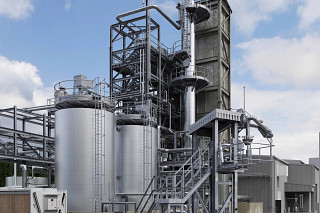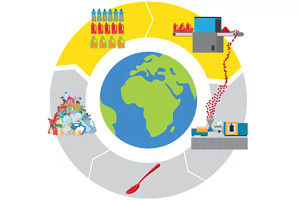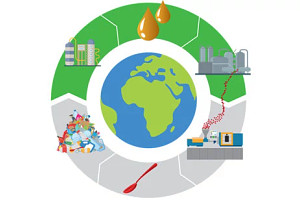Change Language :

igus invests in the chemical recycling of Mura Technology Limited
HydroPRS technology regains resources from plastic waste in 30 minutes

Every year, eight million tonnes of plastic end up in the world's oceans. At the same time, the value of these lost resources is 80 billion US dollars. The problem: to date, the majority of plastic has been incinerated and only 14 per cent recycled. Globally, mixed waste always remains, in the case of non-technical plastic in quantities 100 to 1,000 times greater. This is where chemical recycling from Mura Technology Limited offers new solutions.
The Hydrothermal Plastic Recycling Solution (HydroPRS) was developed in 2007 and tested over ten years in a pilot plant in Australia. With HydroPRS, conventional non-recyclable plastic waste can be converted back into crude oil within 30 minutes, and the method is far more resource-efficient than the extraction of fossil crude oil, as it saves up to 5 barrels of oil per tonne of processed plastic waste. Only water, high temperatures and pressure are used to separate and reconnect the cells. One plant alone can process 20,000 tonnes of plastic in one year, reducing CO2 emissions by 28,180 tonnes. This corresponds to the annual consumption of 5,983 cars or the annual energy requirements of 4,914 households. However, the plant's capacity is to be tripled in the long term.
Classic plastic recycling vs. recycling with HydroPRS
igus® supports the circular economy of plastic
In the future, chemical recycling will be able to utilise its advantages where conventional recycling cannot. To support Mura in the start-up phase and help the technology achieve a global breakthrough, igus® invested four million pounds sterling (4.7 million euros) in January 2020 and increased the investment to a total of 5 million euros in March 2021. Thanks to this support and the establishment and expansion of further partnerships, Mura was able to start construction of the first commercial HydroPRS plant. This will be built at the Wilton International industrial site in Teesside in the north-east of England.
The video shows the HydroPRS oil extraction process
Since April 2021, Dow Chemical, the world's second-largest chemical company, has been another partner on board. The collaboration will further drive the scaling of Mura's advanced recycling process: Dow will use the newly obtained raw materials to develop new plastics for food packaging and other packaging products that will eventually be fed back into global supply chains.
This is how the process is planned: Waste companies supply the plastic waste to meet their recycling targets. Oil is then recovered, which is available at a similar price to fossil oil. In the first step, a total of four Catalytic Hydrothermal Reactors will be built in Teesside to process over 80,000 tonnes of plastic waste per year. Further plants are also planned in Germany, the USA and Asia.
Video of the large construction site in England
Construction progress of the first plant
In April 2021, Mura Technology Ltd. began construction of the first large-scale plant for recycling unsorted plastic waste in England. The first installation on site took place on 15 July 2022, followed by the first opening on 26 October 2023, when investors, partners and supporters were able to view the plant for the first time. Proper commissioning will take place in 2024.

